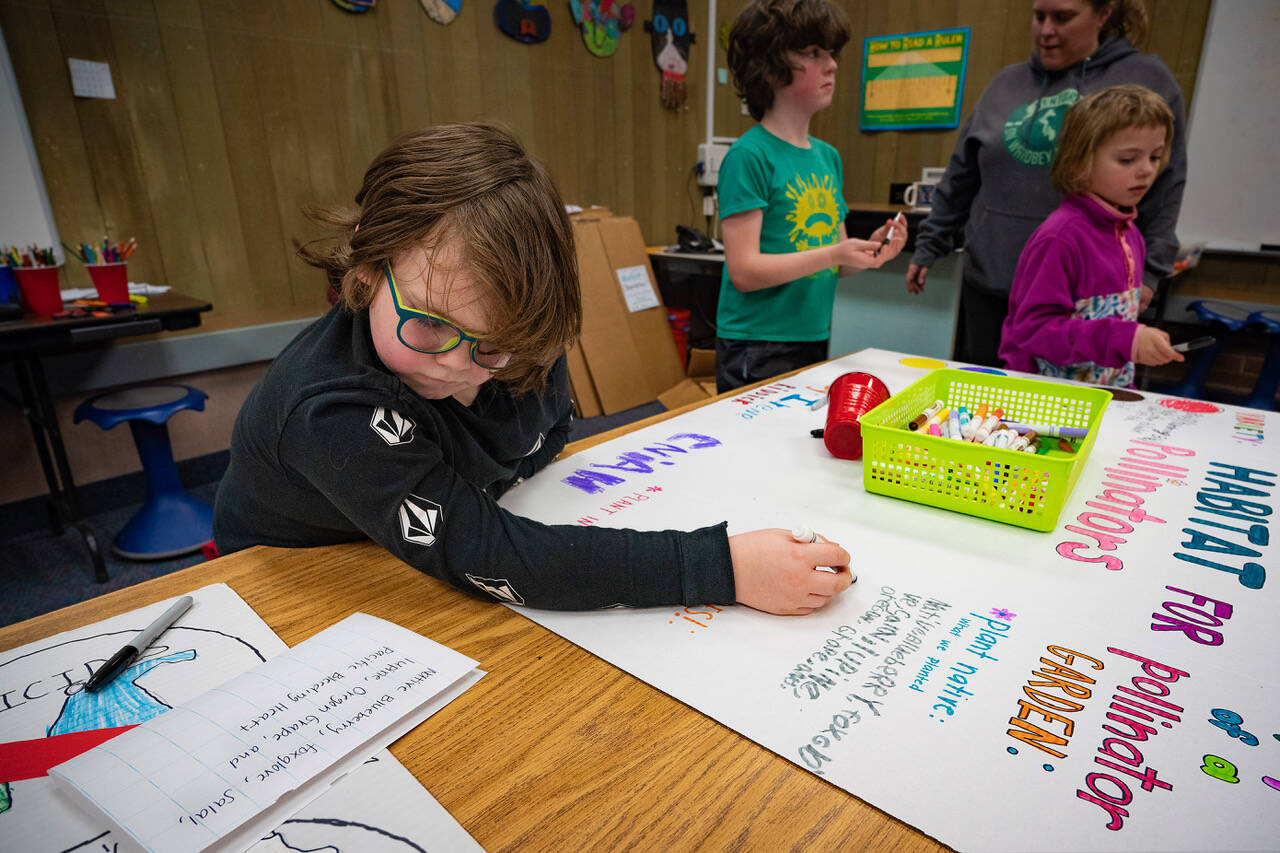Helping the environment doesn’t have to be a difficult task. A group of South Whidbey students have shown that it can be as simple as planting a garden for native pollinators or removing invasive species.
This week, students from South Whidbey School District’s Alternative Learning Experience – known as ALE – program were hard at work designing posters summarizing their projects, which focus on improving habitats.
Come next week, the students plan to present their climate science projects at a conference in Lacey, Washington, hosted by the Office of the Superintendent of Public Instruction and the Pacific Education Institute. The kids will also meet state legislators representing their district.
Amanda Pitts, the volunteer coordinator and environmental education assistant for the ALE program, said that the kids have spent the past two years working on their projects. Created during the COVID-19 pandemic, the alternative educational program allows students great flexibility in their learning.
“It’s almost like a big science fair on Thursday,” she said of the upcoming conference. “And then Friday we are meeting with all different government officials, including Jay Inslee, and they’re speaking to the kids about climate action and science in Washington state.”
Third grader Irene Doleshel explained that her group is focusing on the topics of pollinator habitats and salmon-friendly gardening.
“You want to make sure that the plants are close together so the pollinators can find them easily instead of them being so far away that the pollinators waste way more energy than they need to,” Doleshel said.
Fellow group member and second grader Coniah Pitts piped up, “Some pollinators only go to shapes or colors, or both.”
Pesticides, litter and pollution are all not habitat-friendly, which is something they plan to address in their presentation. When talking about pollution going into the sea, the group started discussing salmon.
“And then we decided to take it up a notch and we made a salmon-friendly garden,” said second grader Riddick Bochantin.
When asked about the upcoming trip to Olympia, the youngsters expressed excitement about getting to stay in different hotels.
Another group is tackling the topic of invasive species removal and habitat restoration.
“We took out a bunch of invasive species, like blackberry, from the Organic Farm School and we brought in a bunch of new, more native plants,” said fifth grader Sam Courteau, who was busy making a graph Tuesday afternoon of the native plants.
Fellow group member and fourth grader Justus Pitts gathered the data and wrote a document explaining the project.
“Successful habitat restoration requires knowing the species’ life cycles and the food, water, nutrients, space, and shelter that is needed to sustain a species population,” the document stated.
The students planted 109 bare-root native plants from a local native plant farm, including devil’s club, tall Oregon grapes, birch trees, osoberry, snowberries, baldhip roses and nootka roses.
Sixth grader Layla Akhter and fifth grader Satya Kuhn were tasked with beautifying the group’s poster for the presentation, using plenty of glitter in the process. Together they created a comic strip on the subject.
Middle school ALE students will present a project titled “Taking Action for Our Future: Biomonitoring on Whidbey Island.” Biologist and environmental educator Andi Kopit explained that biomonitoring is the use of indicator species to assess the health or contamination of an environment. The students in this group are using biomonitoring methods to collect data on the native and invasive species, phenology, and water quality of Double Bluff Beach in Freeland.
“I’m doing this because I know that research and biomonitoring is very important to help teach people about what they can do to help the environment and our future,” eighth grader Lucas Pitts said.
Other students in this group include Lil Greenheron, Arya Bochantin and Margaret Ellis.
South Whidbey ALE students will get to meet other young climate scientists at the conference on Jan. 25. A total of 20 student groups from around the state will convene at the summit.



